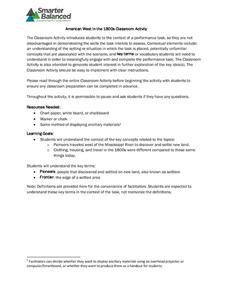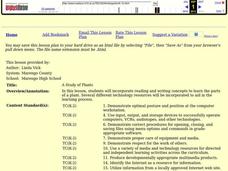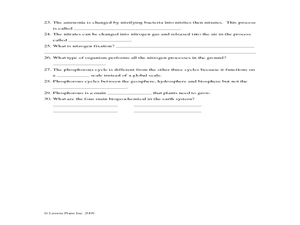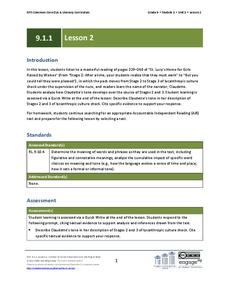Smarter Balanced
American West in the 1800s
To establish a context for an assessment or a study of pioneers and the American frontier in the 1800s, groups examine photos and record observations about clothing, housing, and travel.
Teach-nology
Root Words Activity
A study of prefixes and root words can help your learners with their word choice in writing. Participants review the meaning of 13 prefixes before adding them to root words and defining the new words.
EngageNY
Grade 9 ELA Module 1: Unit 3, Lesson 11
The study of Romeo and Juliet continues as pairs use the provided summary tool worksheet to record evidence of how Shakespeare uses dramatic irony to heighten the tension in Juliet's soliloquy in Act 3, scene 2, lines 1–31.
Curated OER
A Study of Plants
Using a variety of multi-media resources, your high schoolers become familiar with the parts of plant and create a story about plants using vocabulary learned during their research of plants. Completed stories are published using the...
Curated OER
A Lesson on Atmosphere & Symbolism screams a study of Edgar Allan Poe's "The Raven" on Halloween
Students normally "scared" of poetry welcome "The Raven" lesson plans at Halloween.
Curated OER
A Study Guide for The Phantom of the Opera
Immerse yourself in the beautiful, twisted world of Andrew Lloyd Webber's The Phantom of the Opera. A detailed lesson plan provides important details about the writing, stagecraft, music, and literary elements of the famous musical, as...
What So Proudly We Hail
Life, Liberty, and the Pursuit of Happiness: A Lesson on the Declaration of Independence
What does it mean to say that a right is unalienable? How did the founding fathers convey this revolutionary concept in the Declaration of Independence? Engage in a close reading and analysis of the Declaration of Independence, and...
Montana Natural History Center
Studying Grassland Ecosystems
At first glance, grassland ecosystems might seem dull and uninteresting, but once you start to explore it's amazing the things you'll find! Through this series of engaging lessons, activities, and experiments, elementary students examine...
Bully Free Systems
Bully Free Lesson Plans—Eighth Grade
Middle schoolers are likely very familiar with the concept of bullying and cliques. Discuss their experiences and brainstorm ways to handle peer conflict and feelings of exclusion with a poem that focuses on bullying, and a second lesson...
Houghton Mifflin Harcourt
Nature: Friend and Foe: Extra Support Lessons (Theme 6)
Breaking down words into syllables has two benefits: it improves vocabulary and it improves understanding of a text. The third and final resource in a series of materials designed to be used with Nature: Friend or Foe offers extra...
Texas Center for Learning Disabilities
Second-Grade Comprehension-Based Intervention
Help your youngsters find meaning in the text they read with this series of five intervention lessons. Offering explicit, step-by-step instructions for walking children through shared readings of leveled books, these...
Houghton Mifflin Harcourt
Person to Person: Extra Support Lessons (Theme 4)
Authors use many strategies when writing stories. A series of extra support lessons breaks down those strategies, as well as key grammatical and phonics-based concepts to support struggling learners. The last of three lessons offers...
Curated OER
Word Origins
Have you ever studied historical words and found that they were deeply rooted in racism or prejudice? Select a long list of these words to have your class examine. What familiar roots do they have? Do they know when this word originally...
Curated OER
Root Words
Learnersstudy root words. In this word study lesson, they identify the root words from several compound words. There are examples listed in this lesson plan.
Curated OER
Latin Roots: dict, vent, duct (Advanced)
Such a comprehensive way to learn vocabulary! Complete the puzzle, read the vocabulary in context, and get a thorough definition for each vocabulary word. This resource focuses on words containing three Latin roots: dict, vent, and duct.
Curated OER
Word Roots: Nat, Tract, Sequ
Who doesn't love a challenge? Provide your class with this word search to reinforce the vocabulary they're learning with the roots nat, tract and sequ.
Macmillan Education
Time Management
A valuable skills lesson for all grade levels and subject areas, encourage your learners to consider how they are spending their time throughout the day and offer tips for prioritizing and managing daily tasks.
Curated OER
Biogeochemical Cycles Study Guide
The four cycles in Earth's biogeochemical system are covered in this instructional activity. Science stars fill in the blanks or define vocabulary terms pertaining to the hydrologic, carbon, nitrogen, and phosphorous cycles. This...
Curated OER
Figurative and literal language through the study of Shakespeare
Sixth graders explore figurative and literal language. They study literary devices through short pieces of Shakespeare's work. Then investigate Shakespeare's works and life.
Curated OER
Root Words Worksheet
Explore the parts of words! Fourth and fifth graders study root words with this activity. They combine words with a given prefix and root word, like combat. There are 13 words to combine!
Missouri Department of Elementary
The Hope to Cope: Coping Skills
Making decisions can be stressful, even for sixth graders. And even students this young have developed coping skills, some positive and some negative, to help them deal with stress. Class members are asked to identify several of their...
EngageNY
Grade 9 ELA Module 1, Unit 1, Lesson 2
How can you read a character's tone? What about a narrator's tone? Analyze Karen Russell's "St. Lucy's Home for Girls Raised by Wolves" with a lesson that focuses on how word choice can change tone and how tone can affect the development...
Curated OER
Sounding out accuracy, Build a Word
Learners demonstrate how to build words. In this word study lesson, students play a game where they must choose two index cards from each bucket and put them together to build a word.
Curated OER
Journey to Understanding Vocabulary
Students examine word parts. In this word study instructional activity, students practice breaking words into parts and using their knowledge of Greek roots, prefixes, and suffixes determine the words' meanings.

























